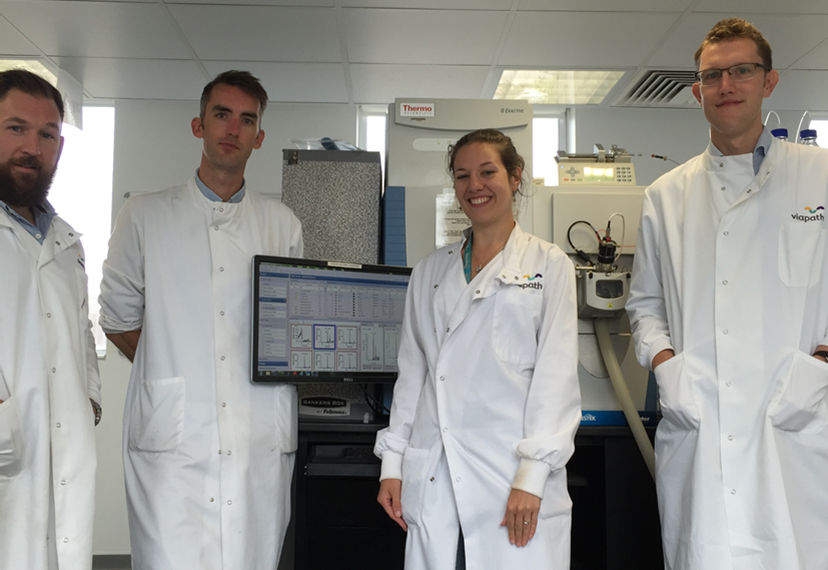Focus on: The Drugs of Abuse Testing Laboratory
Modernising urine drugs of abuse testing at Viapath
Testing for drugs of abuse is an ever-evolving field. In the Toxicology Laboratory, the process used to test for drugs of abuse in urine changed in November 2015. Samples are no longer ‘screened’ using a range of immunoassays and then some drugs ‘confirmed’. Instead, all urines are now analysed directly by high-resolution mass spectrometry for a range of specific drugs and metabolites. As well as a faster overall turnaround, this approach also enables us to look for additional compounds such as dihydrocodeine on all samples as part of the Standard Urine Drug Screen. There are also additions to the drug testing repertoire, such as ketamine, mephedrone and tramadol, as part of the new ‘Premium Urine Drugs Screen’. Other new tests, including pregabalin and gabapentin, will be available soon.
Identifying sample dilution and/or substitution
All urine samples analysed in the laboratory have creatinine measured as a check on sample integrity. Samples with a creatinine below 2.0 mmol/L are reported with a comment highlighting that the sample is ‘dilute’ and those with a creatinine concentration below 0.5 mmol/L with a comment stating that the sample is ‘extremely dilute’. A non-detectable creatinine might suggest the sample has been substituted with, for instance, weak tea or fruit juice!
Which drugs are measured by mass spectrometry?
High-resolution mass spectrometry is used to test for the compounds listed below, which are reported individually. No further confirmation is required. Cut-off concentrations used are based on the European Workplace Drug Testing Guidelines.
- - Opiates are reported separately as ‘positive’ for samples with a total drug + metabolite concentration greater than 300 µg/L for the following drugs:
- - Morphine and metabolite (morphine-3-glucuronide)
- - Codeine and metabolite (codeine glucuronide)
- - Dihydrocodeine and metabolite (dihydrocodeine glucuronide)
- - 6-Acetylmorphine (sometimes called 6-monoacetylmorphine, a specific heroin (diamorphine) metabolite), is reported as positive for samples with a concentration greater than 10 µg/L
Amfetamines are reported separately as ‘positive’ for samples with concentrations greater than 200 µg/L for the following drugs:
- - Amfetamine (‘Speed’)
- - Metamfetamine (‘Meth’, ‘Crystal meth’)
- - MDMA (‘Ecstasy’)
- - Cocaine (measured as the metabolite benzoylecgonine) is reported as ‘positive’ for samples with a benzoylecgonine concentration greater than 150 µg/L
- - Methadone and its major methadone metabolite, EDDP, are reported separately as ‘positive’ at concentrations greater than 250 µg/L
The additional drugs and metabolites reported when a Premium Urine Drug Screen is requested are listed below:
- - Buprenorphine is reported as ‘positive’ for samples with concentrations greater than 5 µg/L
- - The sum of the major buprenorphine metabolites (norbuprenorphine, buprenorphine glucuronide and norbuprenorphine glucuronide) is also reported as ‘positive’ for samples with a total concentration greater than 5 µg/L
- - Ketamine is reported as ‘positive’ for samples if the total concentration of ketamine and the major metabolite, norketamine, is greater than 50 µg/L
- - Mephedrone is reported as ‘positive’ for samples with concentrations greater than 200 µg/L
- - Tramadol is reported as ‘positive’ for samples if the total concentration of tramadol and its major metabolites, N-desmethyltramadol and O-desmethyltramadol, is greater than 200 µg/L
Which other analytes are measured?
All urine samples are routinely analysed by immunoassay for cannabis (tetrahydrocannabinol: THC) and cannabis metabolites, and for benzodiazepines. Barbiturates are not screened for routinely because they are rarely encountered nowadays but can still be tested for on request for individual samples. Urine or plasma alcohol (ethanol) is measured by an enzymatic assay and, although not measured routinely for every sample, can also be requested. If requesting an alcohol measurement on urine, a non-preserved sample is suitable. However, if plasma alcohol is required, the sample should be collected into a fluoride oxalate blood collection tube.
- - Benzodiazepines are reported as ‘positive’ for samples with a total concentration greater than 300 µg/L
- - Cannabis is reported as ‘positive’ for samples with a total concentration greater than 50 µg/L
- - The concentration of urine/plasma alcohol is reported, as opposed to a ‘positive’ or ‘negative’ report. The limit of detection for the test is 10 mg/dL
The importance of testing for metabolites
The methadone metabolite, EDDP, and metabolites of buprenorphine are measured separately to help identify possible sample adulteration (i.e. the addition of parent drug to the sample). A ‘positive’ result from an immunoassay or dipstick for replacement medications, such as methadone or buprenorphine (as Subutex or Suboxone), can arise from adulterated urine samples since the metabolites are not measured separately. For buprenorphine taken sublingually, clients spitting out partially-absorbed tablets concealed under the tongue into urine pots to produce falsely positive results could also be possible. It is for these reasons that the laboratory report includes separate results for methadone and EDDP and buprenorphine and buprenorphine metabolites.
Identifying substances
Our high-resolution mass spectrometer can also be used to help identify unknown tablets, powders and capsules. We have previously analysed smoking products to identify synthetic cannabinoids, cigarette butts and contents of syringes. For such requests, please contact the laboratory prior to sending any samples.
Further questions or queries?
Further information on the Urine Drugs of Abuse Testing Service is available from the laboratory or from the Viapath website. Request forms and the User Information Leaflet are also available to print and download for clinic staff.
Please contact the laboratory with any specific requests on cases for drugs not currently listed – we may be able to help!
Web: www.viapath.co.uk/departments-and-laboratories/drugs-of-abuse-laboratory...
Tel: 020 3299 5881
 The 'Drugs of Abuse' team and high-resolution mass spectrometer in use for urine testing at Kings College Hospital.
The 'Drugs of Abuse' team and high-resolution mass spectrometer in use for urine testing at Kings College Hospital.

